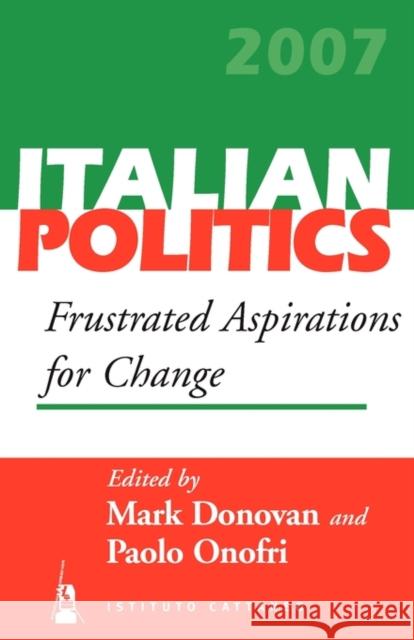Frustrated Aspirations for Change » książka
Frustrated Aspirations for Change
ISBN-13: 9781845456382 / Angielski / Miękka / 2009 / 308 str.
Uncertainty about the future of the government and strong anti-political sentiment dominated Italian politics in 2007. Following a government crisis in February, rooted in the question of Italy's role in Afghanistan, Prime Minister Romano Prodi was able to re-establish his coalition, but in the spring it suffered a clear setback in local elections amidst a climate of growing unpopularity. Initial chapters in this volume analyse these events as well as some important initiatives aimed, in different ways, at containing public disaffection towards the political class: the establishment of the Democratic Party, the electoral referendum campaign, and Silvio Berlusconi's announcement of the birth of a new, center-right political party. As demonstrated in following chapters, the government did still manage to achieve a degree of success during the year in combating tax evasion and reducing the budget deficit as a result of increased tax revenue and more effective control of public expenditure. A number of redistributive goals were achieved in this way, as the volume's examination of government social policy makes clear. Final chapters complete the picture of the state of Italian society in a year characterized by a fragile government facing a number challenging issues subject to veto: the liberalization program and the uncompleted introduction of fiscal federalism, the ever-challenging management of the national health system, the role of the Bank of Italy, the relationship with the Catholic Church and the legislation on de facto couples, crime and security. Mark Donovan teaches Politics in the School of European Studies, Cardiff University where he has specialized in the study of Italian politics. His most recent publication is a co-edited special issue of Modern Italy (November 2008) on "The Centre in Italian Politics." Paolo Onofri teaches Economics at the University of Bologna. His most recent publications with Il Mulino include: I mercati finanziari internazionali. Nino Andreatta e la politica economica (2006).
Uncertainty about the future of the government and strong anti-political sentiment dominated Italian politics in 2007. Following a government crisis in February, rooted in the question of Italys role in Afghanistan, Prime Minister Romano Prodi was able to re-establish his coalition, but in the spring it suffered a clear setback in local elections amidst a climate of growing unpopularity. Initial chapters in this volume analyse these events as well as some important initiatives aimed, in different ways, at containing public disaffection towards the political class: the establishment of the Democratic Party, the electoral referendum campaign, and Silvio Berlusconis announcement of the birth of a new, center-right political party. As demonstrated in following chapters, the government did still manage to achieve a degree of success during the year in combating tax evasion and reducing the budget deficit as a result of increased tax revenue and more effective control of public expenditure. A number of redistributive goals were achieved in this way, as the volumes examination of government social policy makes clear. Final chapters complete the picture of the state of Italian society in a year characterized by a fragile government facing a number challenging issues subject to veto: the liberalization program and the uncompleted introduction of fiscal federalism, the ever-challenging management of the national health system, the role of the Bank of Italy, the relationship with the Catholic Church and the legislation on de facto couples, crime and security.Mark Donovan teaches Politics in the School of European Studies, Cardiff University where he has specialized in the study of Italian politics. His most recent publication is a co-edited special issue of Modern Italy (November 2008) on "The Centre in Italian Politics."Paolo Onofri teaches Economics at the University of Bologna. His most recent publications with Il Mulino include: I mercati finanziari internazionali. Nino Andreatta e la politica economica (2006).











